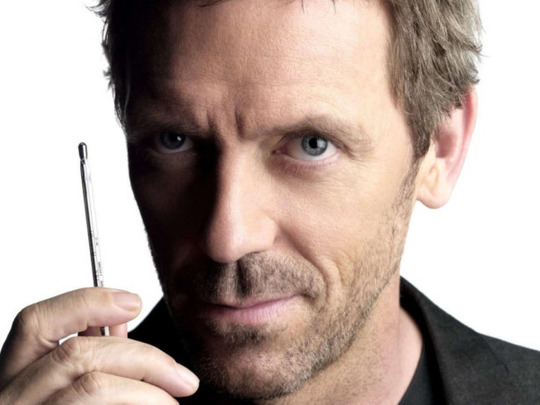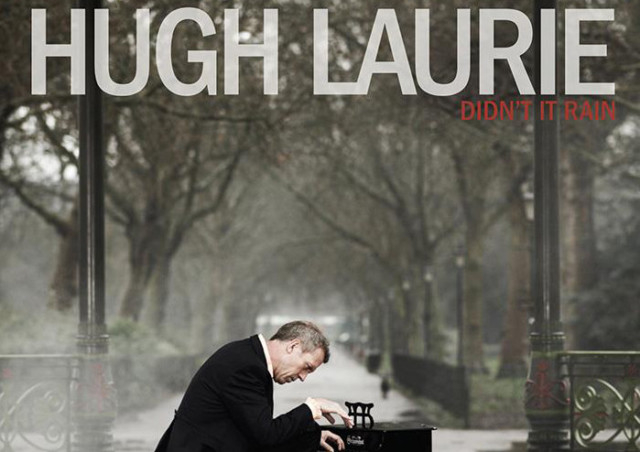
To put Hugh Laurie’s two albums in the context with which he’s most associated, 2011’s Let Them Talk was like the pilot episode of a television series: With handsomely arranged renditions of standards such as After You’ve Gone and St James Infirmary, this was where we learned that the British star of TV’s smash-hit House loves nothing more than old-school American blues and R&B.
“It was kind of expositional,” said Laurie, 54, on a recent afternoon in Burbank, discussing his music — in which he sings and plays piano — before the start of a West Coast tour. “Whereas this one is the second act.”
Released in August, Didn’t It Rain was recorded in LA under the same circumstances as Let Them Talk, with production by Joe Henry and instrumental support from Henry’s team of top-shelf players. (Though he moved back to London after House ended in 2012, Laurie’s acting career still regularly brings him here; next year he’ll appear with George Clooney in Brad Bird’s Tomorrowland.)
But if his debut mainly demonstrated his affection for the material, Didn’t It Rain makes more room for Laurie’s personality in weird, funky versions of tunes including Careless Love and The St. Louis Blues. And it doesn’t shy from pondering his outsider’s relationship with the songs, as when he refers to himself in the album’s liner notes as a “white middle-class Englishman drilling protected wilderness.”
I love that description. It suggests you were trying to preempt any scepticism about your playing this music.
I just thought it’d be quicker — not that it’s worked. I am of course very aware of all the suspicions people might have. I’d have them myself if I were looking at me. And there’s no particular answer to it. The whole question of authenticity is a very cloudy area. And it would take a great deal more than some liner notes to really get into it.
Is it even worth getting into, though? The idea that someone might not be allowed to make a certain kind of music — that seems so dead to me.
My hope is that it’s dead here. It’s still writhing around in its final death throes in England. This country, one of the things I love about it is that people are less interested in what has gone before than in what is to come. The country I come from is obsessed with what’s gone before: Where are you from? What are your credentials? It’s a tribal society.
Were you thinking about the subject differently on the second album compared to the first?
Quite apart from the notion of authenticity, the first one was: Here’s a guy from a different profession. ‘Is he just dabbling? He’s gonna lose interest and throw this toy away.’ I hope eventually I’ll get to the point where people trust that this isn’t just a diversion for me. But it’ll take time. And I’m ready for it to take a long time. A decade, maybe. Wait — how many decades do I have left?
For an actor, the mere fact that you’ve released a second album puts you in a smaller box.
But then a sixth album? Tiny box.
I like this record better than the first.
So do I.
On Let Them Talk you sound like you’re having a good time, which is no small feat. But Didn’t It Rain gives such a deeper impression of who you are — or anyway who you want to appear to be.
That was exactly my hope going into it. It feels richer and expanded in so many different directions. I’m so proud of it. I was proud of the first one too, but it was drier; it had a kind of earnestness to it. The second time I didn’t need to say the same things and could sort of push on a bit.
I’d imagine too that you were more comfortable with the band.
When we made the first record, I’d met these guys at noon, and by 12:25 we were recording.
That’s a testament to their professionalism, which can be a beautiful thing. But maybe it can also be an impediment.
There’s a sort of politeness. People don’t dare crack the same kinds of jokes. They don’t dress the same. And they don’t feel safe to try things in front of each other. When you’ve been living on a tour bus bumping into each for a couple of months, it changes things.
Getting to that point seems especially important with this music, much of which is so familiar. The only thing left to do is put your spin on it.
That’s true of about half these songs. With St James Infirmary, people are like, ‘Blimey, really?’ But there are other songs — the Mississippi Sheiks song Tom Jones sang on the first album — I don’t believe anyone’s heard that for years. Some songs you can present without spin; other ones, yeah, what’s the point of doing it if not to look at it in a different way?
You want something more idiosyncratic.
Yes, but not for its own sake. There are some songs that have been around the block so many times — Summertime, say — that you’re only gonna wind up in a place where you’re just trying to be quirky. That doesn’t interest me. We can embellish and repaint, but we can’t just disassemble it and turn it into something else.
I’m not sure that’s something to be wary of.
The motivation matters. The aren’t-we-being-inventive thing, I can find that off-putting: “Too many notes, Mozart.” As everybody does, I admire and revere the great Art Tatum. But there are moments when I listen to him and say, “Oh, just play the tune.”
This might be your veneration of tradition as an Englishman.
It might also be the fact that I am, you have to understand, completely hamstrung by a lack of ability. I’m like the dog in the Tom and Jerry cartoons who’s chained up to the post. And the rest of the band are Tom and Jerry running around the dog.
Maybe that’s why your live gigs have been more satisfying to me than your records. I saw you at the Mint after the first album came out; it was like you suddenly had full access to all your interpretive skills.
I think that’s right. On a record you can hear someone’s taste and dexterity and virtuosity, but that’s all you hear. Whereas when you watch somebody, the way a person strums a single chord — that can be an incredibly powerful thing.
It changes the way the audience thinks about you.
And that changes us. We’ve had a couple of places we’ve gone to for a second time, and that’s where you have a really interesting comparison. First time was great but felt a little bit like a recital. Second time there was a sort of undeniable force in what we were doing that actually roused people to a place they didn’t expect. It sounds like boasting — because it is.












